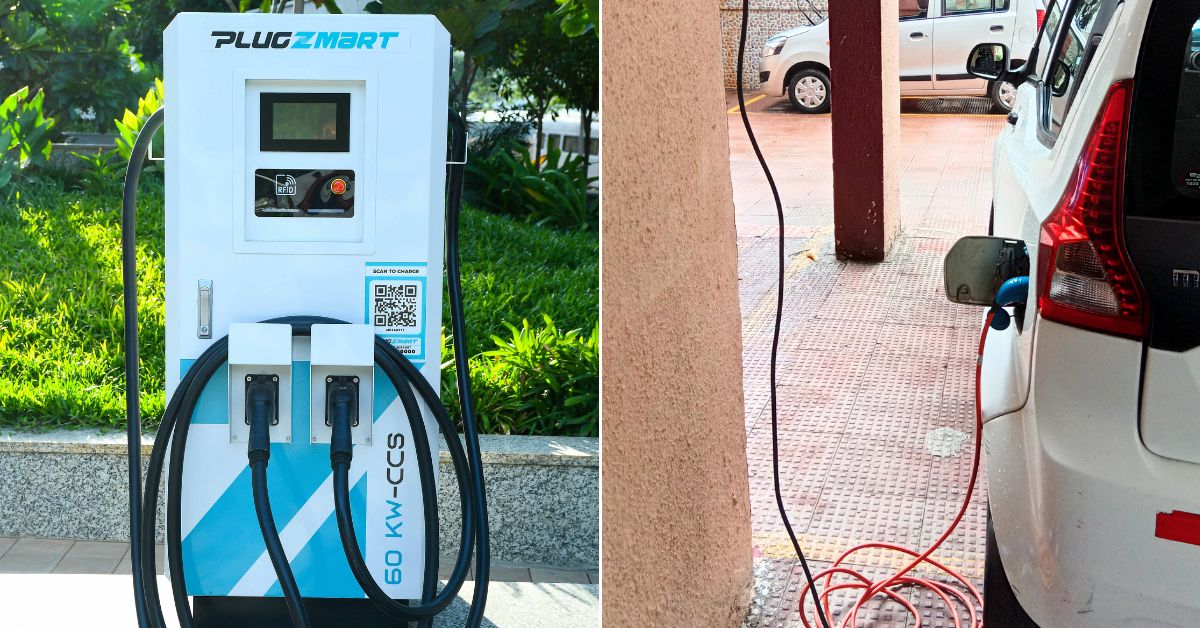Plugzmart — a Chennai-based original equipment manufacturer (OEM) of EV chargers — obtained certification for its 60kW DC fast electric vehicle (EV) charger from the Automotive Research Association of India (ARAI) late last month. ARAI is a research institute with the Union Ministry of Heavy Industries, which develops standards for vehicles and their components.
This is an important development in advancing an indigenous EV infrastructure in India given how it has been unable to keep up with the growing fleet of domestic EVs. What’s more, the indigenous manufacturing of its (charging infrastructure) key components is at a nascent stage.
But what does the ARAI certification mean for Plugzmart’s 60kW DC fast charger? This certification for the Chennai-based startup’s fast charger and proprietary controller card signifies their compliance with stringent operational safety standards and efficiency norms in India.
Speaking to The Better India back in December 2022, co-founder Ragavendra Ravichandran said, “A majority of EV chargers in India today are being imported and are of low quality. They’re largely imported from China. [This is because] Chinese chargers are priced low, but there is no support from Chinese manufacturers once installed, which is a key issue.”

“We miss the technical stronghold of the imported products and find it difficult to resolve issues without service support. As EV adoption increases on the consumer and commercial sides, the requirement for chargers from manufacturers of 2, 3, and 4-wheelers and charge point operators is going to scale rapidly,” he added. The ARAI certification for their fast DC charger, which can offer 75% charge in 30 minutes, is another step towards addressing this issue.
Meanwhile, speaking on the milestone of achieving this certification for their DC fast charger, Vivek Samynathan, founder and CEO of Plugzmart, says, “Securing the ARAI certification for our 60kW DC fast charger, especially with our controller card, is a significant achievement for us. As part of our broader vision, we are dedicated to building a comprehensive ecosystem of hardware and software solutions in the energy domain.”
“Our goal is to provide end-to-end solutions that not only address the current needs of the electric vehicle sector but also pave the way for future innovations in sustainable energy. By integrating smart technologies, advanced control systems, and IoT-enabled platforms, we aim to create a seamless, efficient, and scalable energy infrastructure that supports the global transition to greener and more sustainable transportation options,” he adds.
Developing the fast charger
Speaking to The Better India, Vivek says, “The development of Plugzmart’s 60kW DC Fast Charger began around the same time as other DC charger projects with a dedicated focus on high-power charging solutions initiated about two years ago. We went through approximately three prototypes before arriving at the current model. Each prototype underwent rigorous testing to refine efficiency, power management, and safety standards.”
Over these two years, there were multiple challenges they had to overcome in the development process. “The primary challenge was designing a proprietary controller card that would seamlessly handle high-speed charging while maintaining a compact size,” he adds.

What does a controller card do? “The controller card manages power distribution, communication, and safety protocols during charging. It monitors critical parameters, such as voltage, current, and temperature to prevent overheating and overcharging, ensuring safe operation. The controller also enables intelligent load management, balancing power across multiple charging points, enabling simultaneous charging of multiple EVs,” says Ragavendra.
“Achieving efficient heat dissipation at such high power levels, minimising energy losses, and preventing component damage were critical challenges too. We also focused on ensuring compatibility with multiple vehicle models and integrating advanced load management features,” he adds. One of the key issues with many common charging stations in India is their inability to cater to different vehicle models and their battery specifications.
How does the charger work?
As Vivek explains, “The 60kW DC Fast Charger converts AC power from the grid into DC power using an internal rectifier (AC/DC converter). It delivers high-power DC output directly to the battery, bypassing the vehicle’s onboard charger for quicker energy transfer. The charger communicates with the vehicle’s Battery Management System (BMS) to determine the required charge level and adjusts the power output dynamically.”
Going further, Vivek also explains some of its key specifications:
- Power Output: 60kW
- Input Voltage: 340-480V AC
- Output Voltage Range: 100V – 1000V DC
- Efficiency: 95%+
- Operating Temperature: -20°C to +50°C
Components and standing apart
Major Components of the DC Fast Charger include:
- Rectifier (AC/DC Converter): Converts incoming AC power to DC power for faster battery charging.
- Cooling System: An advanced air or liquid cooling system ensures the charger operates at safe temperatures during high-power operation.
- Proprietary Controller Card: Manages real-time operations, safety protocols, and communication with the vehicle.
- Power Filters: Ensure clean, stable power output by reducing noise and harmonics, enhancing overall charger performance.
The major materials used in the manufacturing of this EV charger include:
- Aluminium is used for heat sinks and charger housing for its excellent heat dissipation and lightweight properties.
- Copper wiring is employed for its high conductivity, ensuring minimal power losses.
So, how does this charger stand apart from others in the industry?
Ragavendra explains, “The charger features a proprietary controller for intelligent load management, allowing dynamic power distribution and simultaneous vehicle charging. It is specifically designed for four-wheelers and dynamically adjusts power output based on the connected vehicle’s battery capacity and state of charge.”
But can we install it at home?
The 60kW charger is designed for four-wheelers only and can charge a vehicle (with a larger battery pack) from 0 to 80% in 60 to 90 minutes. For vehicles with smaller battery packs, it can go from 0 to 75% charge in 30 minutes.
“While this charger is primarily designed for public or commercial use, it can be installed in residential homes with sufficient grid capacity (340V+ AC supply). However, most homeowners may opt for smaller chargers (7-22 kW) due to space and electrical limitations. For those who can meet the requirements, setting up this fast charger requires a robust electrical infrastructure and space for cooling and ventilation,” explains Ragavendra.
Developing components in-house
The components developed in-house include the controller card, PLC module, and software for load management. What is the PLC module? According to Vivek, “The PLC (Power Line Communication) module transmits data over the same power lines used for charging. This reduces installation complexity and allows real-time communication between the charger and the vehicle’s onboard systems.”
“The PLC module enables the charger to negotiate with the vehicle on how much power it needs, ensuring the vehicle receives the optimal charge rate. It ensures compatibility with various vehicle types and allows the charger to comply with international charging standards, making it versatile for different environments,” it adds. In some systems, PLC modules are also involved in enabling Vehicle-to-Grid (V2G) communication where the vehicle can return power to the grid, thus helping with grid stabilization.
However, not every component is developed in-house. Some are still imported. Vivek explains, “We source semiconductors, rectifiers, and cooling systems from trusted suppliers within India and abroad, particularly from China and Taiwan, known for their expertise in high-power electronics.”
Cost and customer base
A single unit of the 60kW DC Fast Charger with its proprietary controller card and PLC module costs around Rs 8 to Rs 9 lakh depending on customisation and quantity.
Meanwhile, speaking on the customer base for their fast charger, Vivek says, “We have attracted interest from fleet operators, EV manufacturers, and charging network operators.”
“Several companies, particularly in public transportation and fleet management, have shown interest. We have received preliminary commitments and purchase orders from fleet operators and EV charging infrastructure developers, including local government initiatives for public charging,” he adds.
(Edited by Pranita Bhat; Images courtesy Plugzmart)
